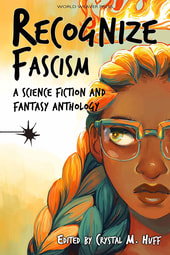 Guest Blog by Phoebe Barton When the biohazard symbol was being workshopped, its designers were looking for something with a very specific quality: "memorable but meaningless." The symbol they came up with, made of smooth curves terminating in sharp spikes, could have meant anything. The same is true of words, and in my story "A Brilliant Light, An Unreachable Dawn," I built a habitat's slow descent into fascism around that truth. Politically, there's no greater biohazard than fascism, and it does its best to keep people from talking about it. Under fascism, words are simultaneously all-important and irrelevant, constantly shifting depending on the situation, and this is the theme I built "A Brilliant Light, An Unreachable Dawn" around. The right words, carefully chosen, do much to shape how people think. How often have you seen the Cold War cast as a struggle between democracy and communism? Words and phrases don't have any meanings except what we give them, and those meanings change easily. We're seeing it today, and not just with phrases like "officer-involved shooting" or words like "patriotism." Consider "antifa," an abbreviation of "anti-fascist" that goes back decades. Consider how much certain governments and political parties would rather we parse that word as, say, "Anne Tifa." A noise divorced from its origin, memorable but meaningless, just like the biohazard symbol. In "A Brilliant Light, An Unreachable Dawn," I didn't have to invent many words and phrases to characterize Phoenix Halo's rotting society. Fascist Callisto's claims of "pan-Jovian co-prosperous amity" were directly inspired by the Greater East Asia Co-Prosperity Sphere, the name that fascist Japan hid its empire behind during the Second World War. I mention "the Himalia Regional Processing Centre, where the Callistonians detained desperate Belter refugees on a lonely chunk of ice" — this phrasing comes directly from the Nauru Regional Processing Centre, where the Australian government detains asylum seekers far from its own shores. The West claimed to fight fascism during the Second World War, but seventy-five years later, it's in the West where the words and phrases of fascism are finding fertile ground to poison. The roots of fascism have been here for a long time, but too many people have been content to let its putrid vines climb the walls and crack the foundations of the world. I consider "A Brilliant Light, An Unreachable Dawn" to be optimistic, in its way: it conceives of a world centuries from now where fascism is not dominant and where life is widespread. There's no telling whether or not that future will come about, but I know one way to make sure it won't: by not raising our voices, and our fists, against it. Phoebe Barton is a queer trans science fiction writer. Her short fiction has appeared in venues such as Analog, On Spec, and Kaleidotrope. She is an Associate Editor at Escape Pod, is a graduate of the Clarion West Writers Workshop, and lives with a robot in the sky above Toronto.
0 Comments
Leave a Reply. |
World Weaver PressPublishing fantasy, paranormal, and science fiction. Archives
February 2024
|
- Home
-
Books
-
All Books
>
- Beyond the Glass Slipper
- Bite Somebody
- Bite Somebody Else
- Black Pearl Dreaming
- Cassandra Complex
- Causality Loop
- Clockwork, Curses, and Coal
- Continuum
- Corvidae
- Cursed: Wickedly Fun Stories
- Dream Eater
- Equus
- Fae
- Falling of the Moon
- Far Orbit
- Far Orbit Apogee
- Fractured Days
- Frozen Fairy Tales
- Glass and Gardens: Solarpunk Summers
- Glass and Gardens: Solarpunk Winters
- Grandmother Paradox
- Grimm, Grit, and Gasoline
- Haunted Housewives
- Heir to the Lamp
- He Sees You When He's Creepin': Tales of Krampus
- Into the Moonless Night
- Jack Jetstark's Intergalactic Freakshow
- King of Ash and Bones (ebook)
- Krampusnacht
- Last Dream of Her Mortal Soul
- Meddlers of Moonshine
- Mothers of Enchantment
- Mrs Claus
- Multispecies Cities
- Murder in the Generative Kitchen
- Recognize Fascism
- Scarecrow
- Sirens
- Shards of History
- Shattered Fates
- Skull and Pestle
- Solarpunk (Translation)
- Solarpunk Creatures
- Solomon's Bell
- SonofaWitch!
- Speculative Story Bites
- Trenchcoats, Towers, and Trolls
- Weredog Whisperer
- Wolves and Witches
- Anthologies and Collections
- Novels
- Novellas
- Fairy Tale
- Fantasy
- Romance
- Science Fiction
- Urban/Contemporary Fantasy
- Young Adult SFF
-
All Books
>
- Blog
- About
- Contact
- Press / Publicity
- Newsletter Signup
- Privacy Policy
- Store

 RSS Feed
RSS Feed